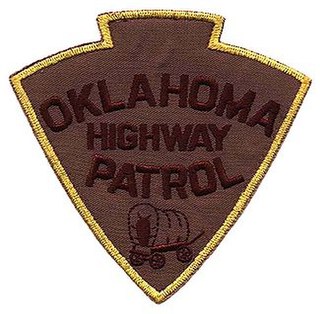
The Texas Department of Transportation is a Texas state government agency responsible for construction and maintenance of the state's immense state highway system and the support of the state's maritime, aviation, rail, and public transportation systems. TxDOT previously administered vehicle registration prior to the creation of the Texas Department of Motor Vehicles in November 2009.

The government of Texas operates under the Constitution of Texas and consists of a unitary democratic state government operating under a presidential system that uses the Dillon Rule, as well as governments at the county and municipal levels.

The Oklahoma Highway Patrol (OHP) is a major state law enforcement agency of the government of Oklahoma. A division of the Oklahoma Department of Public Safety, the OHP has traffic enforcement jurisdiction throughout the state. OHP was legislatively created on July 1, 1937, due to the growing problem of motor vehicle collisions, the expansion of highway systems, and the increase in criminal activities.

The Oklahoma State Bureau of Investigation (OSBI) is an independent state law enforcement agency of the government of Oklahoma. The OSBI assists the county sheriff offices and city police departments of the state, and is the primary investigative agency of the state government. OSBI works independent of the Oklahoma Department of Public Safety to investigate criminal law violations within the state at the request of statutory authorized requesters. The OSBI was created in 1925 during the term of Governor Martin E. Trapp.

The Oregon attorney general is a statutory officer within the executive branch of the state of Oregon, and serves as the chief legal officer of the state, heading its Department of Justice with its six operating divisions. The attorney general is chosen by statewide partisan election to serve a term of four years. The incumbent, Ellen Rosenblum, was sworn in on June 29, 2012, replacing John Kroger, a Democrat who was elected in 2008 and resigned six months before the end of his term to become president of Reed College. She was re-elected in 2016 and 2020.
The Washington Community and Technical Colleges system consists of 34 public, two-year institutions of higher education which specialize in vocational, technical, worker retraining, and university transfer programs. Most of the member colleges award associate degrees and certificates, although some also offer specialized bachelor degrees. The largest college of the 34 state-assisted institutions is Bellevue College.

The Georgia Department of Education (GaDOE) is an American agency that governs public education in the state of Georgia. The department manages funding and testing for local educational agencies accountable for student achievement. The department is managed by the State Superintendent of Schools, a publicly elected position currently held by Richard Woods. Former Superintendents of the department have included Linda Schrenko, Kathy Cox, William Bradley Bryant, John Barge, and Charles McDaniel; the first superintendent was John Randolph Lewis, in 1871.
State Registered Domestic Partnerships (SRDP) in Washington were created in 2007 following the Andersen v. King County decision. Subsequent legislation has made an SRDP the equivalent of marriage under state law. As a result of the legalization of same-sex marriage in the state, from June 30, 2014, SRDP will be available only when at least one of the partners is sixty-two years of age or older.
The Alabama Department of Conservation and Natural Resources (ADCNR) is the state agency responsible for the conservation and management of Alabama's natural resources including state parks, state lands, wildlife and aquatic resources. ADCNR also issues hunting and fishing licenses for the state. The department promotes wise stewardship and enjoyment of the state's natural resources through five divisions: Marine Resources, State Lands, State Parks and Wildlife and Freshwater Fisheries. Supporting those divisions are seven support sections: Accounting, Diversity and Recruiting, Engineering, Information and Education, Information Technology, Legal, and Personnel and Payroll.

In California, the Employment Development Department (EDD) is a department of the state government that administers Unemployment Insurance (UI), Disability Insurance (DI), and Paid Family Leave (PFL) programs. The department also provides employment service programs and collects the state's labor market information and employment data. EDD is one of California's three major taxation agencies, alongside California Department of Tax and Fee Administration and the Franchise Tax Board. In addition to collecting unemployment insurance taxes, the department administers the reporting, collection, and enforcement of the state's personal income taxes.

The Washington State Legislative Youth Advisory Council (LYAC) is the official nonpartisan youth advisory body to the Washington State Legislature on issues related to young people in Washington. Created in July 2005, it consists of approximately 22 members, each serving a two-year term. According to state law, the mission of LYAC is to "examine issues of importance to youth, including but not limited to education, employment, strategies to increase youth participation in state and municipal government, safe environments for youth, substance abuse, emotional and physical health, foster care, poverty, homelessness, and youth access to services on a statewide and municipal basis."

The State Highways of Washington in the U.S. state of Washington comprise a network of over 7,000 miles (11,270 km) of state highways, including all Interstate and U.S. Highways that pass through the state, maintained by the Washington State Department of Transportation (WSDOT). The system spans 8.5% of the state's public road mileage, but carries over half of the traffic. All other public roads in the state are either inside incorporated places or are maintained by the county. The state highway symbol is a white silhouette of George Washington's head.

The attorney general of Washington is the chief legal officer of the U.S. state of Washington and head of the Washington State Office of the Attorney General. The attorney general represents clients of the state and defends the public interest in accordance to state law. The office of the attorney general is an executive office elected by the citizens of Washington, and the officeholder serves a four-year term.
The Washington State University (WSU) Energy Program is a self-supported department within the university. The program staff include engineers, energy specialists, technical experts, software developers, and research librarians. The main office is located in Olympia, Washington, with a satellite office in Spokane, WA.

The Municipal Research and Services Center (MRSC) is a non-profit organization based in Seattle with a mission of "supporting effective local government in Washington through trusted consultation, research, training, and collaboration". Founded in 1934 and funded primarily through a state appropriation, most of MRSC's services are offered free of charge to local government employees and public officials of cities, counties, and some special purpose districts in the State of Washington. MRSC's expertise covers a wide range of subjects including municipal law, municipal finance, urban planning, public works, and public management.
The government of Washington State is the governmental structure of the State of Washington, United States, as established by the Constitution of the State of Washington. The executive is composed of the Governor, several other statewide elected officials and the Governor's cabinet. The Washington State Legislature consists of the House of Representatives and State Senate. The judiciary is composed of the Washington Supreme Court and lower courts. There is also local government, consisting of counties, municipalities and special districts.

The Washington Women's History Consortium is a nonprofit organization that works to document, preserve, and disseminate historical information about the contributions and achievements of women within the state of Washington. The organization was established in 2005 by the state legislature and is managed by the Washington State Historical Society, supported by an advisory board that is appointed by the state governor and legislature. The Consortium is located at the Washington State Capital Museum and Outreach Center in Olympia.
The law of Washington consists of several levels, including constitutional, statutory, regulatory and case law, as well as local ordinances. The Revised Code of Washington forms the general statutory law.












